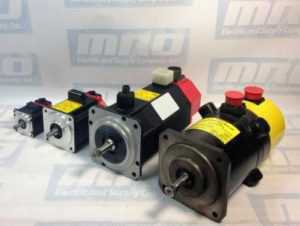Taking care of your FANUC spindle motor and maintaining it properly is the number one way to ensure it will continue to properly run when you need it. Taking the time to understand why it is important to properly maintain your drives and motors is important in itself. Old equipment is definitely more likely fail than newer equipment, but it is entirely possible for new equipment to fail due to improper lubrication, overheating, contamination of other machine fluids, etc.
Regular Maintenance Checklist
- Make sure that there is no other fluids leaking into the Fanuc spindle drive from external sources.
- Check the installation to ensure that everything is connected correctly.
- Check to make sure the spindle is lubricated correctly. Both too much and too little lubrication is a bad thing so make sure to follow your manual to learn how much you need to use.
- Minimizing the amount of vibration on the spindle drive will prevent the dislodging or unseating of any chips/cards/wiring.
- Using proper impact prevention on the bearings inside the spindle will ensure the least amount of physical stress on the machine itself.

By following these steps at least once a month, you are doing yourself a service by making sure your spindle drive is maintained properly. You are saving yourself from having to get parts repaired or buying new parts, and in turn saving money and preventing downtime.
Sometimes you may not have the necessary equipment to make a diagnosis on your motor, but we do. MRO Electric and Supply offers high quality repair services on all motors so you don’t have to worry about it. Please take a look at our website to see all available brands and parts we can service for you.
MRO Electric and Supply has new and refurbished FANUC CNC parts available. For more information, please call 800-691-8511 or email sales@mroelectric.com.
Updated on May 13, 2020 by David Link